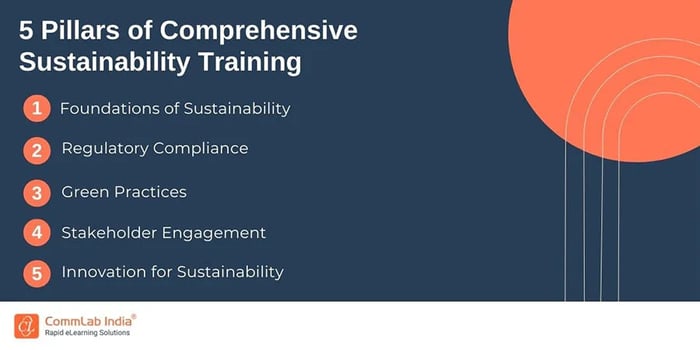How to Reach Your Corporate Goals with Effective Sustainability Training

In today's dynamic landscape, businesses are increasingly aware that long-term success hinges on more than just financial performance. Consumers, investors, and employees alike are demanding accountability for the environmental and social impact of their operations. Embracing sustainability has become a crucial differentiator, separating innovative leaders from those lagging behind.
Trying to Reach Your Corporate Goals? Sustainability Training Can Help You!
Here are a few reasons to say yes -
- Cost reduction
- Enhanced brand reputation and customer loyalty
- Improved employee engagement and morale
- Risk mitigation and compliance
- Innovation and competitive advantage
However, translating good intentions into tangible impact presents a challenge. Many companies struggle to bridge the gap between lofty sustainability goals and practical implementation. Here's where effective sustainability training emerges as a game-changer. By empowering employees with the knowledge, skills, and motivation to drive positive change, training can unlock remarkable potential, propelling your organization toward a more sustainable and successful future.
The Business Case for Sustainability Training: Investing in a Win-Win Strategy
Sustainability training isn't just an altruistic endeavor; it's a strategic investment with tangible benefits that directly contribute to achieving your core business goals. Consider these compelling reasons to prioritize training.
1. Cost Reduction
Sustainability isn't about spending more; it's about smarter resource management. Training equips employees with tools and strategies to improve resource efficiency, from reducing energy consumption in offices to minimizing waste in production processes. These efforts translate into significant cost savings over time, boosting your bottom line.
2. Enhanced Brand Reputation and Customer Loyalty
Consumers are increasingly making purchasing decisions based on a company's social and environmental responsibility. Effective sustainability training fosters a culture of ethical practices, leading to a positive brand image that resonates with conscious consumers. This translates into increased customer loyalty, brand advocacy, and ultimately, market share growth.
→ Download Case Study: eLearning for Sustainability Training
3. Improved Employee Engagement and Morale
When employees understand the positive impact of their daily actions, they become more engaged and invested in their work. Sustainability training fosters a sense of purpose and shared responsibility, leading to higher employee engagement, morale, collaboration, and productivity.
4. Risk Mitigation and Compliance
Environmental regulations are constantly evolving, and non-compliance can lead to hefty fines and reputational damage. Training ensures your employees understand and adhere to regulations, mitigating legal risks and safeguarding your company's future.
5. Innovation and Competitive Advantage
Sustainability training doesn't just address existing challenges; it fosters a culture of innovation and problem-solving. By empowering employees to identify and implement sustainable solutions, companies gain a competitive edge in the marketplace. Here are the 5 pillars of sustainability training in a nutshell.

Cultivating Sustainable Champions: Building an Effective Training Program
The foundation of an impactful sustainability training program lies in a thorough understanding of your company's needs and your employees' current knowledge. Conducting a needs assessment is crucial to ensure your training is targeted, relevant, and delivers maximum impact.
Start by mapping your sustainability goals and identifying areas where employee action can make a significant difference. Are you aiming to reduce energy consumption in offices? Minimize waste in production processes? Enhance ethical sourcing practices? Clearly defining your goals provides a roadmap for training content and evaluation. Watch this video to have an initial idea of how you can get started with a powerful sustainability training program.
Next, assess your employees' current understanding of sustainability. Surveys, focus groups, and interviews can offer valuable insights into their knowledge, attitudes, and perceived barriers to adopting sustainable practices. This information helps you tailor the training to address specific knowledge gaps and address any concerns or hesitations.
With a clear understanding of your needs and audience, you can move on to designing engaging and relevant content. Ditch the dry lectures and one-size-fits-all approach. Instead, embrace a variety of formats such as microlearning, scenario-based learning, etc and various delivery methods that cater to different learning styles and preferences.
Consider incorporating:
- Interactive workshops: Facilitate group discussions, role-playing, and problem-solving activities to encourage active participation and application of learning.
- Custom eLearning modules: Offer flexible, self-paced learning options with gamified elements, quizzes, and real-world case studies. Here are a few strategies to create engaging content.

- Expert guest speakers: Bring in sustainability professionals to share their experiences and insights, inspiring employees and adding credibility to the training.
- Mentorship programs: Connect experienced employees with newer ones to foster knowledge sharing and peer-to-peer support.
From Training to Transformation: Embedding Sustainability into the Workplace Culture
Effective sustainability training doesn't end with a certificate. It's about creating a culture of continuous learning, improvement and shared responsibility where sustainable practices become ingrained in everyday operations. Here's how:
- Lead by Example: Management commitment is crucial for successful implementation. Leaders must demonstrate their own commitment to sustainability through actions, decisions, and communication. Be transparent about your goals, celebrate successes, and actively participate in training initiatives.
- Integrate Sustainability into the Workplace: Go beyond training sessions and embed sustainability into daily practices. Encourage departments to develop sustainable action plans, provide resource-efficient tools and equipment, and offer incentives for eco-friendly behaviors. Consider initiatives like carpooling programs, bike-sharing options, or on-site composting facilities.
- Empower and Recognize Champions: Encourage employee ownership and innovation. Create platforms for employees to share ideas, suggest improvements, and lead sustainability initiatives. Recognize and reward those who embody sustainable practices, inspiring others to follow suit.
- Facilitate Collaboration and Learning: Promote a culture of open communication and knowledge sharing. Establish internal sustainability communities or forums where employees can learn from each other, share best practices, and troubleshoot challenges.
- Continuously Evolve and Adapt: Remember, sustainability is a journey, not a destination. Regularly evaluate your progress, gather feedback from employees, and adapt your training programs and practices based on evolving needs and regulations. Stay updated on industry trends, incorporate new technologies, and continuously strive to improve your sustainability performance.
Wrapping Up!
By fostering a culture of collaboration, engagement, and commitment, you can unleash the full potential of your sustainability training program. Remember, your employees are your greatest asset in this journey. Equip them with the knowledge, skills, and motivation to lead the way towards a more sustainable future, not just for your business, but for the planet as a whole. Check out this case study to understand how we leveraged eLearning for sustainability training for an agrotechnology major.





